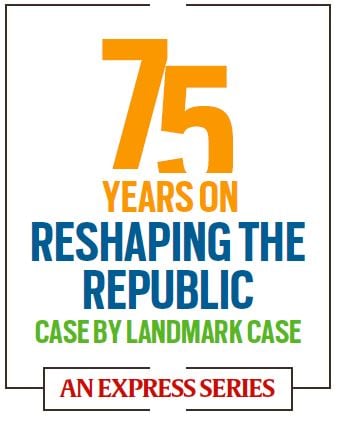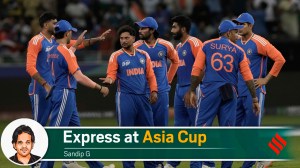Minutes past midnight, on August 15, 1947, the echoes of Mahatma Gandhi ki jai and Bharat Mata ki jai reverberated through the Cannanore (now Kannur) jail where Communist leader A K Gopalan, then 43, was in solitary confinement. He had secretly kept a national flag with him for the occasion. At dawn, he hoisted the Tricolour where other prisoners gathered to hear him speak. Barely four or five minutes into his speech, the jail authorities stopped him.
A day later, accused of stirring up the people “against His Majesty the Emperor”, Gopalan (or AKG, as is popularly known) was produced before a magistrate in Calicut (now Kozhikode) and charged with sedition. He was released on October 12, 1947, but just over a month later, he was detained again under the colonial laws that were still in place in the newly independent nation. After India became a republic, the Preventive Detention Act, 1950 was passed to ‘regularise’ detentions of many including AKG.

“I was a political prisoner from 1930 to 1945 in the eyes of a foreign government. Under today’s popular government, I am branded as a criminal,” he wrote in his autobiography In the Cause of the People.
Story continues below this ad
In 1950, he moved the Supreme Court against his detention, perhaps hoping that the freedoms guaranteed by the new Constitution that came into force in 1950 would ensure his release from jail. After all, Article 21 stated that “no person shall be deprived of his life or personal liberty except according to procedure established by law”.
AKG argued that the preventive detention law violated his fundamental rights under, among others, Article 21 and Article 22 of the Constitution (protection against arrest and detention). However, Article 22, while providing for “protection against arrest and detention”, including the right to be informed of charges, the right to a lawyer and the right to be produced before a court within 24 hours, carves out a strategic exception — that protection is suspended when an arrest is under a law that specifically provides for preventive detention. Thus, AK Gopalan v State of Madras would thus go on to become the first case to question the Constitution’s contrariety.
On May 19, 1950 , a six-judge bench held that the preventive detention law was valid and only allowed minor procedural safeguards that the length of detention had to be informed at the time of arrest although it could be extended. While AKG lost his case, the prescient questions it raised continue to shape our rights and freedoms.
“Preventive detention is curtailing someone’s freedom based on their past conduct that was used in England and other parts during war situations. The British used it in India and while we continued it in our Constitution, Gopalan’s case brought in some procedural safeguards. Disclosure of grounds for detention, judicial review were put in place even if Gopalan lost his case in the SC. The argument that we look at our fundamental rights as a bundle and not in isolation also emerged from the arguments by Gopalan’s lawyer,” former Attorney General for India K K Venugopal told The Indian Express. His father M K Nambyar argued for AKG.
Story continues below this ad
Born on October 1, 1904, in Peralasseri village in Kerala’s Kannur district, Ayillyath Kuttiari Gopalan came from an upper-caste Hindu Nambiar family. After completing college, Gopalan worked as a school teacher for seven years. But the stirrings of the nationalist movement drew him away from the classroom. His participation in the Civil Disobedience Movement landed him in jail for the first time at the age of 26.
While he went on to become president of the Kerala Congress and a member of the All India Congress Committee, interactions with communist leaders in prison shifted Gopalan’s politics. By 1934, Gopalan had joined the Congress Socialist Party and, in 1939, when the party merged into the Communist Party, Gopalan became one of Kerala’s earliest Communist leaders, alongside P Krishna Pillai and E M S Namboodiripad.
It is during one such detention, with fellow Communist leader M R Venkataraman, when Gopalan “filed occasional affidavits and wrote to the court as a matter of course”. One of these writ petitions became the AK Gopalan case. The legendary lawyer Nambyar, then a Mangalore-based mofussil lawyer, appeared against then Attorney General and Constituent Assembly member M C Setalvad.
 AKG wrote in his autobiography that he was taken to Delhi to witness the hearing in a “special First Class compartment by two Inspectors and twelve policemen”. In his book, M.K. Nambyar: The Constitutional Visionary, K K Venugopal says that his father, while arguing for AKG, invoked everything from India’s dharmic traditions of justice; a Latin enunciation, saying that the “procedure established by law” under Article 21 would mean ‘jus’ (a broader concept of justice and morality) and not just ‘lex’ (a written law or rule) to even used a quick-witted “quote from an authoritative book by a respected author” to bolster his case — his adversary Setalvad’s own book on civil liberties.
AKG wrote in his autobiography that he was taken to Delhi to witness the hearing in a “special First Class compartment by two Inspectors and twelve policemen”. In his book, M.K. Nambyar: The Constitutional Visionary, K K Venugopal says that his father, while arguing for AKG, invoked everything from India’s dharmic traditions of justice; a Latin enunciation, saying that the “procedure established by law” under Article 21 would mean ‘jus’ (a broader concept of justice and morality) and not just ‘lex’ (a written law or rule) to even used a quick-witted “quote from an authoritative book by a respected author” to bolster his case — his adversary Setalvad’s own book on civil liberties.
Story continues below this ad
However, four of the six judges held that “procedure established by law” is a narrow threshold and a law made by Parliament, in this case the Preventive Detention Act, 1950, was sufficient to suspend the right under Article 21. The majority opinion stated that “law” had been used in the “sense of State-made law and not as an equivalent of law in the abstract or general sense embodying the principles of natural justice.”
Justice Fazl Ali penned a dissent, which Justice Mehr Chand Mahajan concurred with, saying, “The question to be decided is whether the word ‘law’ means nothing more than statute law.” He then held that the word law means “valid law” and “procedure” means “certain definite rules of proceeding and not something which is a mere pretence for procedure”.
 AK Gopalan vs State of Madras
AK Gopalan vs State of Madras
Over two decades later, and a year after his death, AKG stood vindicated — the Supreme Court in its 1978 ruling in Maneka Gandhi v Union of India restored Justice Ali’s dissenting opinion as the Court’s majority opinion and established “due process” as a necessary criteria for any law to be constitutionally valid.
AKG’s son-in-law and former CPI(M) Lok Sabha member P Karunakaran told The Indian Express, “When all other political prisoners arrested by the British were released to mark the day of Independence, AKG did not get any such benefit. He argued that in Independent India, he should not be still detained under the colonial law. The SC verdict was not in his favour, but when the verdict was later overruled, it vindicated Gopalan’s stand with regard to personal liberty.’’
Story continues below this ad
 The case and its relevance today.
The case and its relevance today.
Meanwhile, Gopalan’s detention came up again before the Madras High Court. In 1951, Gopalan, fresh from his defeat in the Supreme Court, himself argued his case and the Court decided in his favour since one of the detention orders did not indicate the period of detention as mandated by law. However, barely 10 yards from the court’s gate, he was served fresh detention orders. After another round of fierce courtroom battle, Gopalan was released for the second time in two days. “But the Madras HC Chief Justice at that time, Justice PV Rajamannar had pulled up the Advocate General for keeping a detention order ready even before the Court’s verdict came. The AG resigned the next day,” Venugopal said, adding that although such instances happen even today, the Courts do not react as swiftly.
By the time he died in 1977 at the age of 72, Gopalan had been jailed 20 times, spending 17 years of his life behind bars. His case, though, keeps vigil that law does not mean just any set of arbitrary orders by those in power but is just and reasonable.


 AKG wrote in his autobiography that he was taken to
AKG wrote in his autobiography that he was taken to  AK Gopalan vs State of Madras
AK Gopalan vs State of Madras The case and its relevance today.
The case and its relevance today.





























